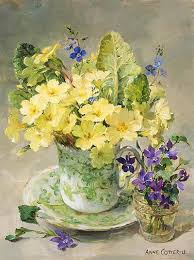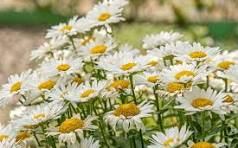Dear Reader,
Originally the primrose is native to the entire Northern Hemisphere. This very persistent wild and garden perennial, once planted out in the garden, blooms again the following year.
The primrose, Primula Vulgaris, is one of the most familiar signs of spring. Typically found in woodlands and beneath hedgerows it thrives in damp shade in a variety of situations, It provides an early source of nectar and pollen for bees and other pollinators, and is used as a caterpillar foodplant by several species of moth.
*
My partner, Francis, has been in hospital this last week with an infection due to a biopsy for prostate cancer. He came home with a beastly cold and cough which I then caught. It is very difficult to sleep when coughing every twenty minutes and I have been feeling low. Fortunately Jessica went to a chemist who sold her Benelyn Cough mixture which seems to be working well. The cough hasn't gone but it is, thank God, better. Who ever said old age is not for sissies was so right. I wasn't prepared for all its machinations although, of course, Shakespeare does tell us in his sonnet, Seven Ages of Man, that all is not going to be rosy as we grow old. I just didn't believe him or take enough notice and now here I am in its midst, battling on. My poem this week says it all.
*
From Gilbert White January 14th 1776 in Hampshire
'Rugged, Siberian weather. the narrow lanes are full of snow in some places....the road-wagons are obliged to stop and the stage-coaches are much embarassed. I was obliged to be much abroad on this day, and scarce ever saw it fellow.'
From James Woodforde January 24th 1790 in Norfolk
'The season so remarkably mild and warm that my brother gathered this morning in my garden some full blown primroses.'
*
Quickening I want the pulse of life that has been asleep to wake, embrace me, put on the light. To hear the thrush, song-repeat, to keep my trust in God to hurry icy winter’s flight. I want to glimpse, under sodden leaves, green shoots to announce life’s circle, its beginnings, have begun. I want to run barefoot, abandon boots, to walk through primrose paths, savour the sun. I want to take off winter’s dress, change its season, to see the coloured petticoats of spring, bloom and show us mortals nature’s reason to start afresh, admire the peacock’s plume. Cellar the coal, brush the ashes from the fire, I want to intertwine, my love, quicken, feel desire. * With very best wishes, Patricia








